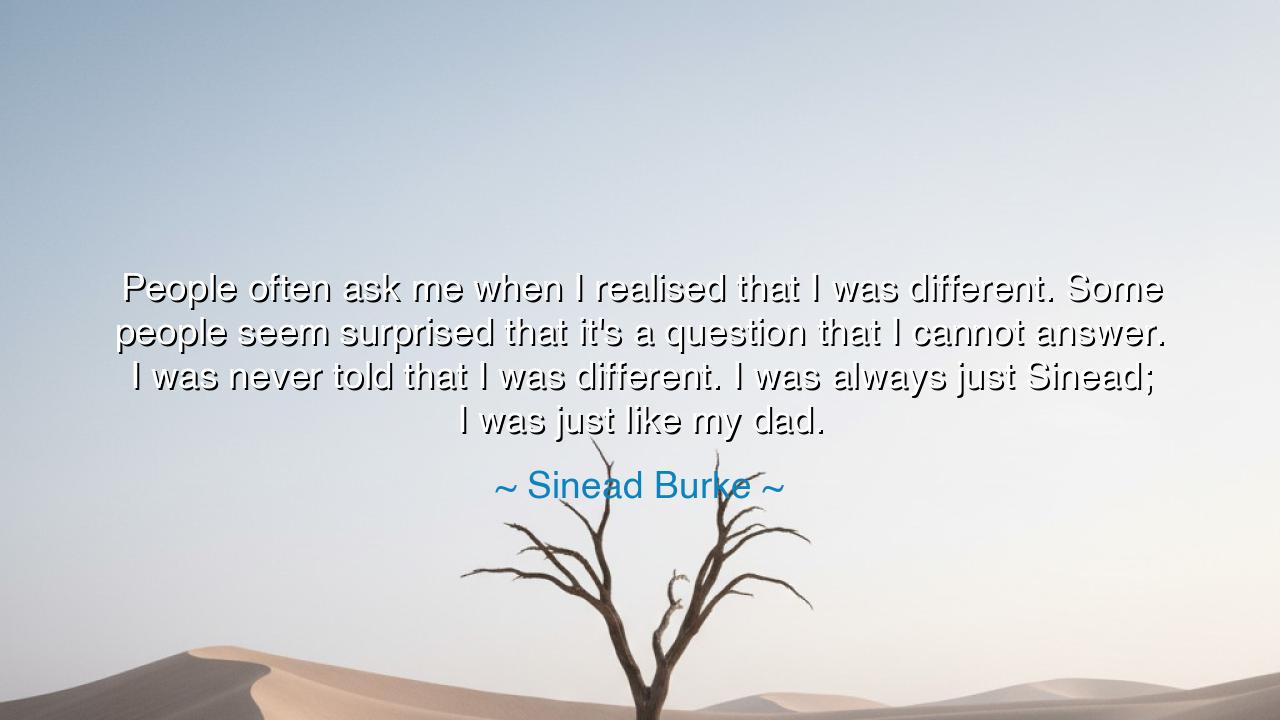
People often ask me when I realised that I was different. Some
People often ask me when I realised that I was different. Some people seem surprised that it's a question that I cannot answer. I was never told that I was different. I was always just Sinead; I was just like my dad.






When Sinéad Burke said, “People often ask me when I realised that I was different. Some people seem surprised that it's a question that I cannot answer. I was never told that I was different. I was always just Sinéad; I was just like my dad,” she was speaking not only of herself, but of a universal truth about identity, dignity, and the way love shapes perception. In her words lies a quiet power — the defiance of one who was seen not through the eyes of pity or otherness, but through the clear and unwavering gaze of belonging. Her quote is not merely about difference; it is about freedom — the freedom to exist without definition or apology.
The origin of this reflection arises from Burke’s life as a writer, educator, and advocate for inclusivity. Born with achondroplasia, a form of dwarfism, she grew up in a world that often labels and divides. Yet within her home, difference was not discussed as limitation, but accepted as normality. Her father too shared her condition, and so she learned early that stature does not define strength, nor appearance dictate worth. In her family, she was not “different” — she was simply herself, rooted in love that recognized no hierarchy of bodies. From this soil of acceptance grew her unshakable confidence and her lifelong mission: to challenge society’s narrow idea of normal.
To understand the depth of her words, one must see the contrast she draws between the world’s gaze and the gaze of love. The world, ever hungry for labels, demands to know when one realizes their difference — as though self-awareness must be tied to deviation. But Burke, raised in the sanctuary of unconditional regard, cannot answer this question, because in her world, “different” was not a thing to be realized; it was simply one way of being human. Her insight exposes the flaw in society’s lens — that we see difference only when taught to, and that the purest form of sight is the kind that looks with acceptance, not comparison.
The ancients, too, spoke of this truth in their own way. The philosopher Epictetus, born a slave and crippled in body, taught that a man is free not when his limbs are whole, but when his mind is his own. “It is not what happens to you,” he said, “but how you react to it that matters.” Like Epictetus, Burke shows that freedom is not granted by circumstance but cultivated by perspective. The home that raised her did not pity her difference; it armed her with understanding that worth is not measured by conformity but by authenticity. Thus, she grew not in the shadow of limitation, but in the sunlight of identity.
Yet her words are not merely personal; they are a mirror to all humanity. For every person carries something that sets them apart — a feature, a flaw, a story the world may call “different.” The tragedy is not in difference itself, but in the world’s insistence that it must be explained. Burke’s voice calls us back to innocence — to the state of being where self-knowledge is not burdened by judgment. Imagine if every child grew, as she did, without the whisper that they were “other.” Imagine a world where to be oneself required no defense. Such a world would not erase diversity, but sanctify it.
The lesson, then, is both tender and powerful: see yourself as you are, not as the world defines you. And if you are fortunate enough to raise others — children, students, or souls in your care — teach them that their value is not conditional upon sameness. Let your home, like Burke’s, be a place where labels dissolve and love names each person simply by their being. For the heart that grows in acceptance grows fearless; it moves through the world not demanding permission to exist, but offering proof that every form of life has its own beauty.
So, my child, remember this truth as you walk through the world: difference is not a discovery; it is an illusion created by comparison. Let not the voices of the world define who you are or what you may become. Whether you stand tall or small, whether your gifts are loud or quiet, let your worth be anchored in the certainty that you were whole from the beginning. Be, as Sinéad Burke was taught to be, yourself without question — not defined by contrast, but by essence. And when others ask you when you realized you were “different,” smile and answer as she might: “I never did. I was always just me.”






AAdministratorAdministrator
Welcome, honored guests. Please leave a comment, we will respond soon